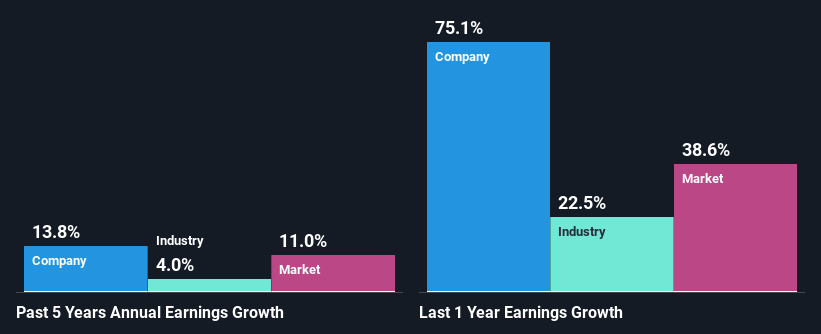Will Weakness in Harvey Norman Holdings Limited's (ASX:HVN) Stock Prove Temporary Given Strong Fundamentals?
It is hard to get excited after looking at Harvey Norman Holdings' (ASX:HVN) recent performance, when its stock has declined 2.2% over the past month. However, stock prices are usually driven by a company’s financial performance over the long term, which in this case looks quite promising. In this article, we decided to focus on Harvey Norman Holdings' ROE.
ROE or return on equity is a useful tool to assess how effectively a company can generate returns on the investment it received from its shareholders. Simply put, it is used to assess the profitability of a company in relation to its equity capital.
View our latest analysis for Harvey Norman Holdings
How To Calculate Return On Equity?
The formula for ROE is:
Return on Equity = Net Profit (from continuing operations) ÷ Shareholders' Equity
So, based on the above formula, the ROE for Harvey Norman Holdings is:
22% = AU$847m ÷ AU$3.9b (Based on the trailing twelve months to June 2021).
The 'return' is the income the business earned over the last year. That means that for every A$1 worth of shareholders' equity, the company generated A$0.22 in profit.
What Has ROE Got To Do With Earnings Growth?
We have already established that ROE serves as an efficient profit-generating gauge for a company's future earnings. Based on how much of its profits the company chooses to reinvest or "retain", we are then able to evaluate a company's future ability to generate profits. Assuming everything else remains unchanged, the higher the ROE and profit retention, the higher the growth rate of a company compared to companies that don't necessarily bear these characteristics.
Harvey Norman Holdings' Earnings Growth And 22% ROE
To begin with, Harvey Norman Holdings seems to have a respectable ROE. Even when compared to the industry average of 22% the company's ROE looks quite decent. This probably goes some way in explaining Harvey Norman Holdings' moderate 14% growth over the past five years amongst other factors.
Next, on comparing with the industry net income growth, we found that Harvey Norman Holdings' growth is quite high when compared to the industry average growth of 0.05% in the same period, which is great to see.
Earnings growth is an important metric to consider when valuing a stock. What investors need to determine next is if the expected earnings growth, or the lack of it, is already built into the share price. Doing so will help them establish if the stock's future looks promising or ominous. Has the market priced in the future outlook for HVN? You can find out in our latest intrinsic value infographic research report.
Is Harvey Norman Holdings Using Its Retained Earnings Effectively?
While Harvey Norman Holdings has a three-year median payout ratio of 72% (which means it retains 28% of profits), the company has still seen a fair bit of earnings growth in the past, meaning that its high payout ratio hasn't hampered its ability to grow.
Besides, Harvey Norman Holdings has been paying dividends for at least ten years or more. This shows that the company is committed to sharing profits with its shareholders. Our latest analyst data shows that the future payout ratio of the company over the next three years is expected to be approximately 74%. However, Harvey Norman Holdings' future ROE is expected to decline to 12% despite there being not much change anticipated in the company's payout ratio.
Summary
On the whole, we feel that Harvey Norman Holdings' performance has been quite good. We are particularly impressed by the considerable earnings growth posted by the company, which was likely backed by its high ROE. While the company is paying out most of its earnings as dividends, it has been able to grow its earnings in spite of it, so that's probably a good sign. With that said, on studying the latest analyst forecasts, we found that while the company has seen growth in its past earnings, analysts expect its future earnings to shrink. To know more about the latest analysts predictions for the company, check out this visualization of analyst forecasts for the company.
Have feedback on this article? Concerned about the content? Get in touch with us directly. Alternatively, email editorial-team (at) simplywallst.com.
This article by Simply Wall St is general in nature. We provide commentary based on historical data and analyst forecasts only using an unbiased methodology and our articles are not intended to be financial advice. It does not constitute a recommendation to buy or sell any stock, and does not take account of your objectives, or your financial situation. We aim to bring you long-term focused analysis driven by fundamental data. Note that our analysis may not factor in the latest price-sensitive company announcements or qualitative material. Simply Wall St has no position in any stocks mentioned.

 Yahoo Finance
Yahoo Finance 
